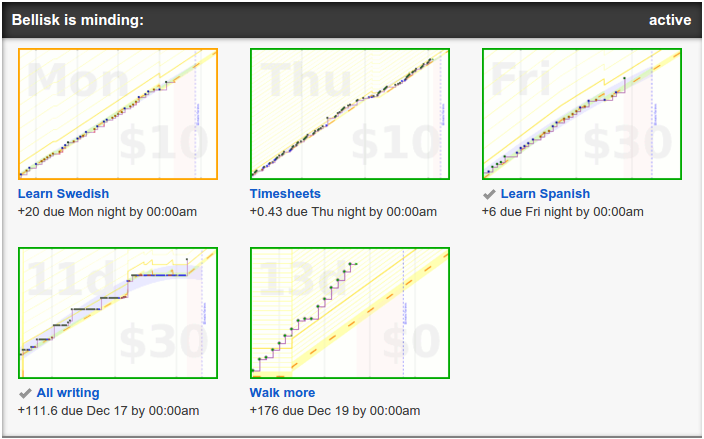To use Beeminder, you define an activity and how often it should be done, and then enter data over time, either manually or through one of many integrations. The website then generates a nice-looking graph of your progress, which, so long as you keep things up, is surely reward enough for your dedication. If you slip up, the financial penalties come into effect. I won't explain in more detail, because there is plenty of information on the Beeminder site and forum.
I was pretty certain, before I started to use Beeminder, that its main mechanism of encouragement would not work on me. When I get into a state of putting something off, of procrastinating, of thinking obsessively and unhelpfully about just how much I wish I could start work on it and how useless I am for not doing it — I thought — having an amount of money tied to its success does not sound like enough to break that deadlock and get me to actually Do the Thing. End result: me losing money and still not fulfilling the tasks I want to do.
After more than a year, having made goals for writing, blogging, learning languages, programming, going to the gym, studying for an exam, snacking and keeping in touch with my family, I can say this: I was almost entirely right. For most of those purposes, Beeminder is really not helpful for me.
Beeminder is useful for motivating yourself for things you want to do, in the long term even if not on the short term — why would you sign up to it to track your Duolingo use if you didn't want to learn a new language, after all? That's not the problem, though. I really want to write more, both blogging and fiction. I really want to work on my gender-neutral toilets and open data projects. I generally enjoy them once I get started, too! To get to that point, though, requires so many hours of procrastination, sobbing, planning, staring into space and self-loathing that it's not really practical to plan for much action in any given span of time. Getting myself to write a blog post or make a phone call is a hard enough, and long enough, process that Beeminder seems to be on the wrong scale to make a difference in it (positive or negative).
Explanations I've tried out for this annoying effect: laziness, irresponsibility, pernicious boringness, not really wanting to do the things I think I do, forgetfulness, perfectionism, and fear/anxiety. The last is the one I've been trying out for the last couple of years, and it explains things well enough but hasn't provided any good ways to get me out of the hole. More recently, in the course of a long run-up to getting myself professionally assessed for Asperger syndrome, I discovered that problems with executive function can be a symptom of that, and can include difficulty planning and initiating tasks. Unfortunately, there isn't a quick solution for poor executive function, only coping mechanisms, but there may be something productive I can do in that direction.
For the time being, Beeminder is not that thing, though I have kept a single writing-focussed task on its books, more for monitoring and keeping a very minimal level of activity going than to spark greater efforts. (I write or paste everything into Draft, which feeds into Beeminder, and aim for 1000 words per week. That's easier to achieve than it sounds, since I'm also including ephemera like my wordier MeFi comments, and since Draft counts words edited, not just written. I've deleted so much in writing this blog post that it currently stands at 676 words long but counts as 1584 towards this goal.)
On the other hand, Beeminder has worked really well for me in keeping up to date with simple, almost mindless tasks, especially those that can be updated automatically. Currently, I use it to track my progress with both Spanish and Swedish in Duolingo and to make myself update my timesheet at work. That task, which last year was my most hated bugbear, and which cost me a bunch of overtime hours because I didn't enter them until, er, six months after they were worked, is now ... well, not pleasant, but certainly bearable. There's also no way I would still be using Duolingo without the bee to remind me about it.
One task I wish I could effectively beemind is going to the gym. I like working out once I get there and it doesn't even take much creative energy to do, but for the moment it's firmly on the wrong side of that dividing line. I recently started a new goal for step-counting, with a very low target number of steps per day that I will slowly ramp up, and I think that will be easier to maintain. Going out for an evening walk to make up my quota on an emergency day should be a lot less difficult than trying to write an essay or half a chapter of fiction!

My current Beeminder goals: Swedish, timesheets, Spanish, writing and walking.
I spent a lot of the last few months suffering from anaemia, feeling exhausted and useless, and now I'm finally feeling better and considering trying to get more stuff done outside of work and sleeping. Despite my skepticism, when I first started using Beeminder, I really hoped it could help me focus more on my creative pursuits. I'll have to keep looking for the solution to that, but in the meantime, it should be useful for keeping up some good habits.
Finally, I can't write about Beeminder without mentioning that they have lovely and very helpful customer service. (Which is good, considering they have my credit card number.)